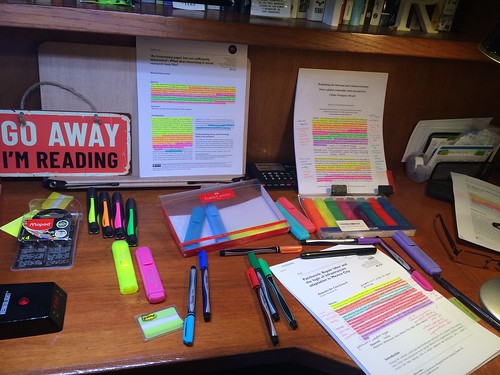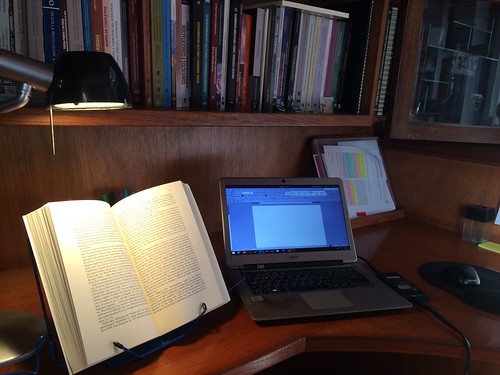“You should write because you love the shape of stories and sentences and the creation of different words on a page. Writing comes from reading, and reading is the finest teacher of how to write.”
― Annie Proulx
In my courses, on my blog, across all my social media platforms, and everywhere I go, I always insist on the importance of developing a writing practice. Well, as I have also systematically repeated on this blog, in order to write, and particularly write well, you also need to read, therefore it is crucially important that you also develop a READING practice.
In this post I offer four suggestions for you to consider how to reframe the way you see reading as an activity in order to help you develop a reading practice.
1. Reading to generate new ideas:
Reading an article or a paper or a book chapter, or a section of a book can be helpful for you to get your thinking juices flowing. I first got this suggestion from Dr. Theresa (Terre) Satterfield. When I started my PhD I asked Terre for advice on how to become a better graduate student. She described to me her daily practice: she would get to her office, get herself a coffee and start reading an article, a book chapter, or a section of a book, in order to get her creative and thinking juices flowing.
To be perfectly honest, if I give a self-reflective look at how I do things, I pretty much always read before I write. I use reading as a generative activity because it helps me get fresher ideas, or link my own thoughts to those posited by other writers. I always feel like I am carrying a huge weight whenever I face The Dreaded Blank Page. Even writing this blog post out of the blue felt like a huge challenge not having read anything and wanting to crank it out just like that.
So what I did to prepare myself to write this blog post was to search on Google Scholar whether any texts on how to develop a reading practice that might have appeared interesting existed. While my search yielded no good results, what I did was to search my own blog for posts on reading. I re-read those in order to give myself new ideas for this post (I also reflected about what I wanted this post to say while showering, if I’m being honest).
Thinking of reading as a generative activity for new ideas gives you a new perspective on things and helps you get started with your writing session. Reading before writing also enables you to avoid seeing the act of reading as a waste of your time or as something you simply do not have the time to do because you have a gazillion other things to do.
2. Reading to remain self-actualized and up-to-date with the literature
A good friend told me recently that it is hard to remain up-to-date with the vast swaths of academic literature that we need to read, for our students, for our own research, for the service work we do like reviewing manuscripts or books or providing feedback to colleagues, postdoctoral researchers and or own students. While he is completely right that there’s too much to read, looking at the activity itself as a way to remain up-to-date can also prove motivating.
Here on my blog I’ve written a metric tonne of blog posts on reading that you may want to check out. Particularly important, I think, is this one on the issue that we face when discussing reading-as-writing: we end up having to legitimise reading as part and parcel of academic writing.
So we can look at the importance of a reading practice through the lenses of self-actualization: we need to systematically involve reading into our writing because that’s how we are going to be able to help our students and colleagues: by remaining up-to-date with the literature. Batch-processing is one strategy we might want to use to catch up with the literature, and in this post I offer a few other strategies that might be of use to those who want to develop a reading practice.
3. Reading as a strategy to overcome Writer’s Block
Every time a colleague of mine emails me and says “I have not been able to write, I am just blocked, help me!” I tell them to stop fighting the urge to write against their current situation and just read. Yes, this may sound counter-intuitive, but if you are facing Writer’s Block and you keep pushing yourself trying to get words out of your brain and fingers, it’s likely that nothing is going to come out and you’ll be all the more frustrated.
Using reading as a tool to help you overcome Writer’s Block enables you to put your mind at ease and do something else. Stop focusing on generating new text and on producing words to put them on paper and start thinking of how what you are reading can nourish your brain and help you focus on what you want to learn. Because writing is a way of learning.
4. Reading as a vehicle to engage in a conversation:
This is perhaps the one that I have tried the hardest to imbue into my students: what you are writing is (or should be) in conversation with the broader literature. Who do you want to be conversing with? Which literatures, which authors, which disciplines?
I always tell my students that in order for them to make a contribution to the literature, they need to map out and discern WHERE they are making a contribution. They can only do that by reading what is out there.
Ok, I have justified why you need to develop a reading practice. So now, how do you go about it? I’m going to share 5 tips that summarize what I’ve learned over the many years I’ve written this blog, taught courses on academic writing and research, and mentored and supervised thesis students. Hopefully some of these strategies will be of help to you.
5 tips to start developing your reading practice:
1. Clarify for yourself WHY you are reading.
Are you reading to catch up with the literature? To better understand a topic? To help a graduate student with their thesis? To learn a new method? Because you are writing a grant proposal and need to engage with and learn about an entirely new topic from scratch? All of these are genuinely valid reasons why you need to read. Just make it clear for yourself.
Side note: I can’t tell you how many times I’ve had to read dozens of books and journal articles and book articles just to understand what my graduate students are working on. I supervise students on a very broad range of topics, so I need to delve into entirely new literatures ALL THE TIME.
2. Book time to read, even if it’s just 15-30 minutes.
I completely understand why you might scoff at this one. “Who has time to read (for pleasure/for work) when I have to send 433 emails, prepare 6 classes, deal with stuff at home, etc.”. Absolutely legitimate concerns. Reading (and writing) often get relegated to the very bottom of the To-Do List. But making SOME time to read can be useful as you develop your reading practice. It doesn’t have to be a 2 day reading retreat (though that kind of sounds lovely). It can be just 15 minutes a day. But making reading a systematic, consistent habit can be helpful as you work to develop a reading practice.
3. Read like a writer.
Yes, this one seems also quite obvious but it is true. And the best book to learn how to read as a writer is Francine Prose’s Reading Like a Writer. It’s an amazing book that teaches you how to read with a view to improve your written prose. Read with the intention to learn how other writers craft their sentences, their paragraphs, their pages, their arguments.
4. Prioritize what you need to read.
I tend to look at everything I have to do and sometimes feel overwhelmed because I don’t know what to focus on. But that’s when I look at my To-Do List and my writing commitments, and I prioritize what I need to read according to those. For example, I am finishing a chapter on qualitative methods. I really want to read a lot of stuff on organizational ethnography, a topic where I have published relatively little. But for now, I need to prioritize my reading and focus on the topic of qualitative methods for political science, public policy and public administration. I’ll make time to read other stuff as soon as I am done with this chapter.
5. Do “Active Reading” (take notes as you read)
This one is quite important. I love reading a book as I go, but the truth is, if I want to use what I am reading as fodder for my writing, I need to take notes. I have written blog posts about how to take notes from books when you can’t write on them (I do not write on any books), and other techniques for note-taking, but more generally, I always recommend to my students that they read and take notes as they progress with their reading. You can also use voice notes if that works better for you.
Hopefully this blog post will re-ignite the reading practice you once had, or help you build one if it’s something you’ve always struggled with. OR maybe this post will inspire you to start reading again if you’ve fallen behind.







0 Responses
Stay in touch with the conversation, subscribe to the RSS feed for comments on this post.